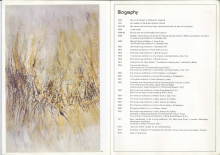22 Oct 1944, Chronology of Events Related to Stanley Civilian Internment Camp
Primary tabs
Death of Francis Arthur Sutton, aged 60.
Francis 'One Arm' Sutton celebrated his sixtieth birthday on February 14, 1944. He wrote in his diary:
I am young no longer, ambition to take the world by storm has passed me and gone. I remember my many failures. I flee from life and do not pursue it, as formerly....Enthusiasm in starting each new job and brushing aside all obstacles is not wholehearted. What's the good? comes too easily to my mind.
He’d had an eventful life: born to a Lincolnshire parson in 1884 and educated at Eton and London University, he’d been a South American railway builder before the war, and lost an arm to a hand-grenade at Gallipoli. He was lobbing back time-lag hand-grenades into the Turkish trenches but after successfully returning six he fell foul of one that had cunningly had its fuse shortened, and it blew his right arm off at the wrist. The thrower, a huge Turkish soldier, leapt into Sutton’s trench to finish the job with his bayonet. Sutton, with no weapon and only his left arm, managed to deflect the bayonet into his thigh. There followed a desperate struggle rolling in the dust during the course of which Sutton was almost knocked out by a rock– it was thrown by a fellow British soldier but failed to find its target and hit Sutton on the head instead. The Turk managed to get on top of the semi-comatose Englishman and was strangling the life out of him when Sutton groped around with his one remaining hand and managed to locate a Gurkha kukri, which he plunged into his assailant’s throat. As the struggle ended, Sutton noticed he’d bitten off the other man’s ear. (I am not making this up – someone else may be, probably Sutton himself, but not me!).
How could such a man not go gold mining in the frozen wastes of newly Bolshevik Siberia? And how could he have avoided being asked to re-organize one of the Red navies? Next he decided to try his luck in war-torn Republican China, seeking to interest one of the rival war-lords in the products of his fertile military inventor’s imagination, and in his own martial skills. The Chinese general who was besieging Sutton and summoned him to negotiate terms of surrender should have known that the resourceful but not overly scrupulous Englishman would shoot him before making a James Bond like escape. Sutton eventually became a general for China’s famous ‘Old Marshall’ Chang Tso-Lin. He made and lost three fortunes in the course of all this.
Sutton was billeted in Block 4, Room 18, along with seven others. He was severely overweight by this time, and his mutilated arm made it impossible for him to sleep soundly in any position but flat on his back; the result was massive and re-echoing snoring. Sutton, to the immense gratitude of his roommates managed to get hold of a tennis ball and had it sewn into his pajama jacket so as to make it impossible for him to sleep on his back. Then he taught himself to get a decent night’s rest on his side.
That story shows that at least some of the determination and courage that had marked Sutton’s life were still with him at the start in Stanley. Sadly these qualities were worn down. His decline after that despairing birthday entry was ‘shockingly rapid’ and his biographer Charles Drage puts down his death to ‘slow starvation’ undermining ‘not so much his superb physique but his always vulnerable emotions’.
He was put on a ‘Special Diet’ but to no avail, and he was eventually admitted to Tweed Bay Hospitalwith ‘beriberi, avitaminosis and bacillary dysentery’ – Drage suggests a simpler diagnosis would have been ‘hunger and heartbreak’. Mrs Anslow, who was nursing in Tweed Bay Hospital at the time, agreed, saying he died from ‘malnutrition and despair’. The end came at 10 a.m. on today. He asked for his clothes to be divided amongst his fellow prisoners, a much needed final act of charity.
Source:
Charles Drage, General of Fortune, 1973 edition

